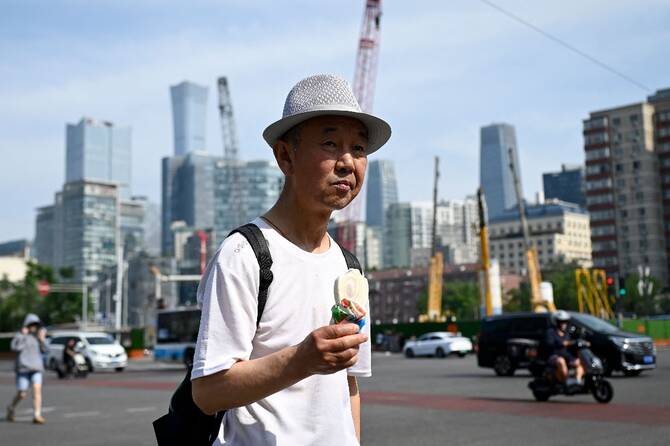BEIJING: Beijing residents sought shade and cooled off in canals on Monday as authorities issued the second-highest heat warning for the Chinese capital on one of its hottest days of the year so far.
China has endured a string of extreme summers in recent years, with heatwaves baking northern regions even as parts of the south have seen catastrophic rain and flooding.
Authorities in the city of 22 million people urged the public to take precautions, with temperatures expected to peak at around 38 degrees Celsius (100 degrees Fahrenheit) on Monday.
“It’s been really hot lately, especially in the past few days,” intern Li Weijun told AFP on Monday afternoon.
The 22-year-old said he had stopped wearing formal clothes to work and delayed his daily exercise until after 10:00 p.m. to stay safe.
“I think it’s related to climate change, and maybe also to the damage done to nature,” he said.
An orange heat warning — the second-highest in a three-tier system — was issued on Monday as officials encouraged people to limit outdoor activity and drink more fluids to avoid heatstroke.
Construction workers should “shorten the amount of time consecutively spent at labor,” while elderly, sick or weakened individuals ought to “avoid excessive exertion,” according to the guidelines.
Zhang Chen, 28, said she carried an umbrella outdoors to prevent sunburn.
“I used to ride a bike, but once it gets this hot, I basically stop doing that,” the IT worker told AFP.
Despite the beating sun, legions of delivery drivers zipped through downtown areas at noon to bring sustenance to Beijing’s office workers.
A few lazed on the backs of their scooters in a shady spot, while elsewhere, people cooled off with ice creams or by taking a dip in the city’s canals.
Beijing is still a few degrees short of breaking its record for the hottest-ever June day, set at 41.1C in 2023.
Human greenhouse gas emissions are driving climate change that causes longer, more frequent and more intense heatwaves.
China is the world’s largest producer of carbon dioxide, a potent greenhouse gas, though it has pledged to bring its emissions to a peak by the end of this decade and to net zero by 2060.
The country has also emerged as a global leader in renewable energy in recent years as it seeks to pivot its massive economy away from highly polluting coal consumption.
In a shady spot near an office building, 42-year-old Lucy Lu spent her lunch break with friends, kicking a shuttlecock through the air — a traditional Chinese game known as “jianzi.”
“I was born and raised in Beijing, and summer here has always been like this,” she said.
“But I do think when the temperature goes over 40C, there should be some time off or work-from-home options to reduce the risk of heatstroke.”
















